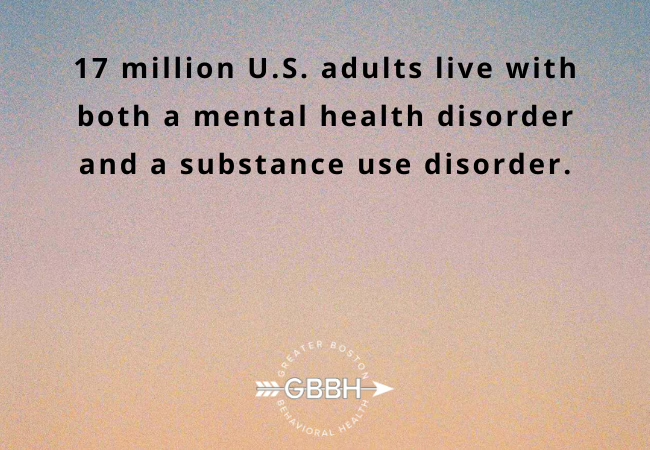When someone is living with both a mental health disorder and a substance use disorder, the path to recovery becomes more complex. This combination—known as dual diagnosis or co-occurring disorders—requires integrated care that addresses both conditions simultaneously. One of the most effective ways to achieve this is through a Partial Hospitalization Program (PHP).
At Greater Boston Behavioral Health, our Partial Hospitalization Program in Boston is specifically designed to support individuals struggling with dual diagnosis conditions. By combining psychiatric care, evidence-based therapies like Cognitive Behavioral Therapy (CBT) and Dialectical Behavior Therapy (DBT), and a structured daily schedule, PHP offers a powerful level of care that can stabilize symptoms, reduce relapse risk, and promote long-term recovery.
This blog explores how PHP works, why it’s especially effective for dual diagnosis treatment, and who can benefit from this level of care.
What Is Dual Diagnosis?
Dual diagnosis refers to the presence of both a mental health condition and a substance use disorder (SUD). These conditions often influence one another and create a cycle that’s difficult to break without specialized care.
Common dual diagnosis combinations include:
- Depression and alcohol use disorder
- Anxiety and benzodiazepine dependence
- PTSD and opioid addiction
- Bipolar disorder and stimulant abuse
- Personality disorders and cannabis misuse
Individuals with dual diagnosis often experience more severe symptoms, higher relapse rates, and greater challenges in relationships, work, and daily functioning—making early, coordinated intervention essential.
What Is a Partial Hospitalization Program (PHP)?
A Partial Hospitalization Program provides intensive, structured mental health care five days a week, typically for 4–6 hours per day. It’s ideal for individuals who need more support than weekly therapy offers but do not require 24-hour inpatient hospitalization.
At Greater Boston Behavioral Health, our PHP bridges the gap between inpatient and outpatient care, offering:
- Individual and group therapy
- Psychiatric evaluation and medication management
- Crisis prevention planning
- Psychoeducation
- Substance use support and relapse prevention
- Skills training based on CBT and DBT
PHP allows clients to return home each evening, which encourages the application of new skills in real-life settings, while maintaining access to daily professional support.
Why PHP Works for Dual Diagnosis Treatment
1. Integrated Mental Health and Substance Use Care
Many traditional programs treat mental illness and substance use separately. In contrast, PHP at Greater Boston Behavioral Health takes an integrated approach, addressing both diagnoses in the same treatment plan. Clients receive therapy and psychiatric care that consider the full picture of their emotional and behavioral health.
This is crucial because:
- Untreated mental health symptoms often drive substance use
- Substance use can worsen or mimic psychiatric symptoms
- Long-term recovery requires treating both conditions together
2. Access to Daily Therapeutic Support
Dual diagnosis clients often experience unpredictable mood swings, anxiety, or intrusive thoughts, especially in early recovery. Daily therapy sessions in PHP provide consistent emotional support, structure, and accountability during this critical time.
Therapies include:
- Cognitive Behavioral Therapy Boston (CBT): Helps identify and change distorted thought patterns that contribute to substance use and emotional distress.
- Dialectical Behavior Therapy in Boston (DBT): Teaches mindfulness, distress tolerance, and emotion regulation—essential for managing cravings and impulsive behavior.
- Anger Management Therapy in Boston: Assists individuals in recognizing emotional triggers and responding with control instead of aggression or substance use.
3. Psychiatric Care and Medication Management
Many individuals with dual diagnosis need medication to stabilize mood, manage anxiety, or reduce cravings. Our PHP includes comprehensive Psychiatric Care in Boston, ensuring that medications are appropriately prescribed, monitored, and adjusted as needed.
This integrated psychiatric support is critical for:
- Addressing co-occurring disorders like depression, bipolar disorder, or PTSD
- Managing withdrawal-related anxiety or mood symptoms
- Preventing medication misuse through careful oversight
4. Skill Development for Long-Term Recovery
Our Mental Health Programs in Boston emphasize the development of real-world coping strategies. Clients learn to:
- Manage emotional triggers without substances
- Improve communication and set boundaries
- Navigate stress without turning to unhealthy behaviors
- Build daily routines that support sobriety and stability
PHP’s structured format ensures that these skills are not only taught but practiced repeatedly in group sessions and real-life scenarios.
5. Seamless Transition Between Levels of Care
Many clients come to PHP after completing detox, inpatient, or residential care. Others start in PHP to avoid hospitalization altogether. At Greater Boston Behavioral Health, we provide a continuum of care that includes:
- Inpatient Treatment Program in Boston – for clients in crisis or in need of 24/7 supervision
- Residential Treatment Program in Boston – for immersive, longer-term recovery support
- Intensive Outpatient Program in Boston (IOP) – for ongoing therapy and structure with more flexibility
- Outpatient therapy and aftercare planning – to maintain progress after PHP
This step-down model allows us to adjust the level of care as you stabilize—so you receive just the right amount of support at every stage.
Who Benefits Most from Dual Diagnosis PHP?
You may benefit from PHP for dual diagnosis if you:
- Are recovering from substance use and struggling with depression, anxiety, PTSD, or mood swings
- Have frequent emotional outbursts, relationship issues, or difficulty coping without using substances
- Need support transitioning from inpatient or residential treatment
- Are at risk of relapse and need structure to stay on track
- Want to avoid hospitalization but require more than outpatient therapy
- Experience strong cravings, impulsivity, or emotional numbness
- Struggle to maintain employment, school attendance, or family responsibilities due to co-occurring disorders
A Typical Day in PHP at Greater Boston Behavioral Health
Morning:
- Mindfulness or grounding activity
- CBT or DBT skills group
- Medication check-in with psychiatric provider (as needed)
Midday:
- Process group or relapse prevention
- Psychoeducation on mental health and substance use
- Lunch and wellness break
Afternoon:
- Individual therapy session (1–2 times/week)
- Family or anger management group (if applicable)
- Discharge planning or goal-setting
This structure provides consistency and therapeutic momentum—key for individuals dealing with multiple diagnoses.
Why Choose Greater Boston Behavioral Health?
At Greater Boston Behavioral Health, we specialize in integrated dual diagnosis care that is compassionate, evidence-based, and deeply personalized. Here’s what makes our Partial Hospitalization Program in Boston uniquely effective:
- Dual diagnosis expertise: Our clinicians are trained to treat both substance use and mental health disorders together—not separately.
- Full-spectrum therapy: From CBT to DBT, anger management to trauma-informed care, we offer a wide range of modalities tailored to your needs.
- On-site psychiatric care: We monitor medications closely, minimizing side effects and supporting stability.
- Flexible levels of care: Whether you need inpatient stabilization, PHP, or step-down IOP, we make sure your care evolves with your recovery.
- Compassionate environment: You’re not just a diagnosis here—you’re a person on a journey, and we’re honored to walk it with you.
Conclusion
Managing a dual diagnosis is challenging—but with the right help, healing is absolutely possible. A Partial Hospitalization Program offers the structure, therapies, and clinical care you need to treat both your mental health and substance use disorder in one integrated plan.
At Greater Boston Behavioral Health, we provide more than just treatment—we offer a path forward, one built on understanding, empowerment, and lasting change. Call (888) 278-0716 today to speak with our team and learn if PHP is the right fit for your recovery.
FAQ on PHP for Dual Diagnosis Treatment
What is dual diagnosis?
Dual diagnosis, also called co-occurring disorders, refers to the presence of both a mental health disorder and a substance use disorder. These conditions must be treated together for long-term recovery.
How does a Partial Hospitalization Program help with dual diagnosis?
PHP provides daily therapy, psychiatric care, medication management, and relapse prevention strategies. It addresses both mental health and substance use in an integrated way.
What therapies are used in PHP for dual diagnosis?
Common therapies include Cognitive Behavioral Therapy (CBT), Dialectical Behavior Therapy (DBT), anger management therapy, trauma-informed care, and mindfulness-based interventions.
Do I need to go to inpatient rehab first?
Not always. PHP is appropriate for individuals who are stable enough to live at home but need structured, intensive treatment. It can follow inpatient care or serve as an alternative for some.
How long does PHP for dual diagnosis last?
Duration varies by individual needs, but most programs last between 2 to 6 weeks. Clients attend treatment 5 days per week for several hours each day.


